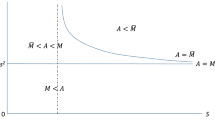Abstract
Earning capacity is a legal term used by most courts in personal injury cases to designate economic losses due to the impairment of the ability to earn money in personal injury cases. Loss of earning capacity is distinguished from a loss of actual or expected earnings. Earning capacity is the expected earnings of a worker who chooses to maximize the expected present value of future actual earnings, while expected earnings are the expected values of actual earnings. The chapter reviews the legal and economic bases for the earning capacity standard of loss, relying on supply, and demand analysis. In addition, the article provides principles that guide the evaluation of earning capacity both prior to and after an injury.
Access this chapter
Tax calculation will be finalised at checkout
Purchases are for personal use only
Similar content being viewed by others
References
Horner, S., & Slesnick, F. (1999). The valuation of earning capacity: Definition, measurement and evidence. Journal of Forensic Economics, 13(1), 13–32.
Robinson, R. H. (2014). Forensic rehabilitation and vocational earning capacity models, chapter 3. In R. Robinson (Ed.), Foundations of forensic vocational rehabilitation. New York: Springer Publishing Company.
Tierney, J. P., & Missun, R. E. (2001). Defining earning capacity: A process paradigm. Journal of Forensic Vocational Analysis, 4, 3–12.
Weed, R. O. (1996). Life care planning and earnings capacity analysis for brain injured clients involved in personal injury litigation utilizing the RAPEL method. NeuroRehabilitation, 7(2), 119–135.
Cases Cited
Barto v. Shore Construction, 2015 U.S. App. LEXIS 15810 (5th Cir.) 9/4/2015
DeWeert v. Stevedoring Services of America, 272 F.3d 1241 (9th Cir.) 11/29/2001
Johnson v. Penrod Drilling Company, 510F.2d 234 (5th Cir.) 1975
Madore v. Ingram, 732 F.2d 475 (5th Cir.) 5/24/1984
Author information
Authors and Affiliations
Editor information
Editors and Affiliations
Copyright information
© 2016 The Author(s)
About this chapter
Cite this chapter
Horner, S., Slesnick, F. (2016). The Meaning of Earning Capacity. In: Tinari, F. (eds) Forensic Economics. Palgrave Macmillan, New York. https://doi.org/10.1057/978-1-137-56392-7_2
Download citation
DOI: https://doi.org/10.1057/978-1-137-56392-7_2
Published:
Publisher Name: Palgrave Macmillan, New York
Print ISBN: 978-1-137-57109-0
Online ISBN: 978-1-137-56392-7
eBook Packages: Economics and FinanceEconomics and Finance (R0)




